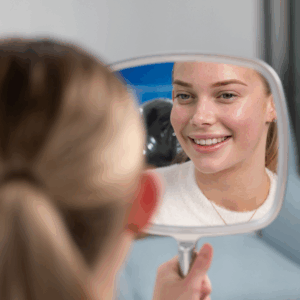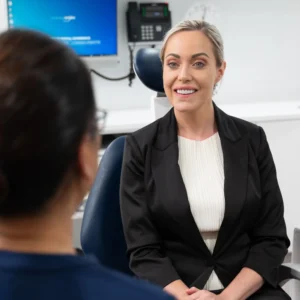Teeth Grinding Symptoms & Treatment
Do you ever wake up from grinding your teeth in your sleep? Or, do you experience the negative impacts of Teeth Grinding? In this article, we will discuss how to stop grinding teeth, and common symptoms and causes.
What Is Teeth Grinding (Bruxism)?
Bruxism (teeth grinding and clenching) is a common condition, often involuntarily occurring while sleeping. Almost half of people will experience Teeth Grinding at one point, and a small percentage of people are frequent Teeth Grinders. Although Bruxism commonly occurs during sleep, it can occur during waking hours.
Teeth Grinding can lead to many dental problems and injuries such as toothaches, jaw pain, sore gums and fractured teeth.
Teeth Grinding Symptoms
At your Dental Check-Up, your Dentist will often be the first to identify Teeth Grinding. This is because your Dentist may notice cracks in your teeth or indentations on your tongue and cheeks. You may also suspect that you are grinding your teeth if you have these Teeth Grinding symptoms:
- A tight or sore jaw
- Toothaches
- Tooth Sensitivity
- Aches in your ears or headaches
- Clicking noise when you open your jaw
- Flattened teeth
- Trouble chewing food
- Cracked tooth enamel
- Worn tooth enamel
- Trouble sleeping
If you’re experiencing any of these Teeth Grinding symptoms, it’s recommended to visit your Dentist to assess your condition.
Common Teeth Grinding Causes
There are various Teeth Grinding causes. Certain lifestyle factors can result in or exacerbate Teeth Grinding. Teeth Grinding causes can include:
- Stress and anxiety
- Caffeine consumption
- Alcohol, smoking or recreational drug use
- Sleep apnoea
- Sleep conditions
- Certain medications
- Anger or frustration
- Deep concentration
If you suffer from Teeth Grinding, it’s important to identify contributing factors and work to reduce their impact on your Dental Health.
Impacts of Teeth Grinding
While occasional Teeth Grinding may not result in problems, frequent Teeth Grinding can lead to Dental issues. Negative impacts of Grinding Teeth can include:
- Cracked or chipped teeth
- Worn tooth enamel
- Flattened teeth
- Damaged crowns, veneers or fillings
- Jaw pain or problems
- Tooth loss (in extreme conditions)
Teeth Grinding Treatment
How to stop grinding teeth? If you suspect that you are grinding teeth in sleep or while awake, it’s important to speak with your Dentist. The Dentist will be able to assess your condition and help to identify causes and provide treatment. Teeth Grinding treatment may include the repair of damaged teeth, assessment of sleep disorders and creation of a custom-fitted Occlusal Splint to wear while asleep.
Your Dentist will likely also suggest managing lifestyle factors that contribute to Teeth Grinding. These may include a healthy sleep routine, limiting stress and anxiety, exercising regularly, limiting consumption of caffeine and alcohol and participating in meditation or relaxation techniques.
Benefits of Occlusal Splints for Teeth Grinding
Your Dentist will likely prescribe a custom-fitted Occlusal Splint to prevent Dental damage from Bruxism. Wearing a custom-fitted Dental Occlusal Splint works to protect your teeth and mouth from the negative impacts of Bruxism. It also helps to relieve pain associated with Teeth Grinding, such as a tense jaw and headaches. Wearing an Occlusal Splint can prevent painful and costly Dental Treatment to repair damage such as cracked teeth, flattened teeth or tooth extractions.
Treat Teeth Grinding Today with Brisbane Smiles
Don’t put off treating your Teeth Grinding any longer – prevent Dental damage and improve your sleep by receiving the right treatment. Visit the friendly and expert Dentists at Brisbane Smiles today.




